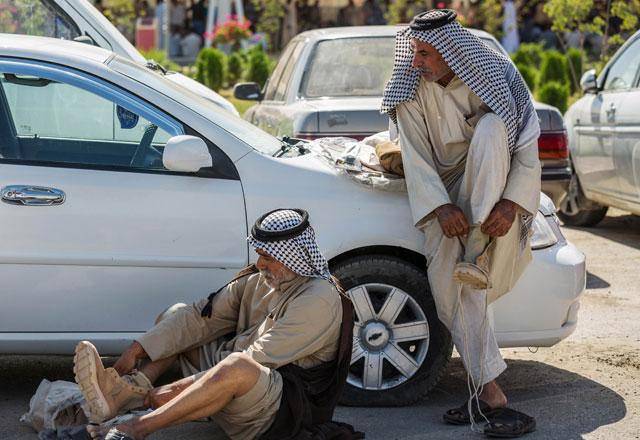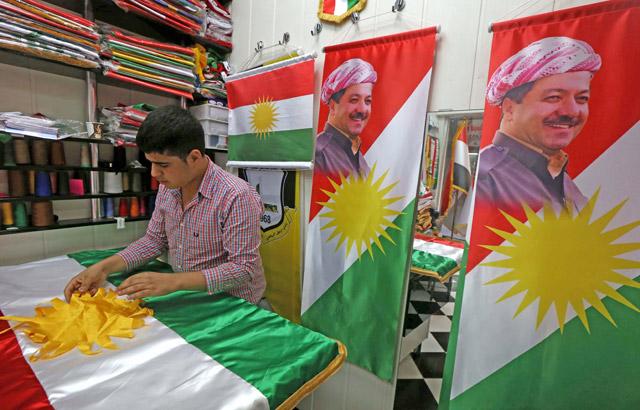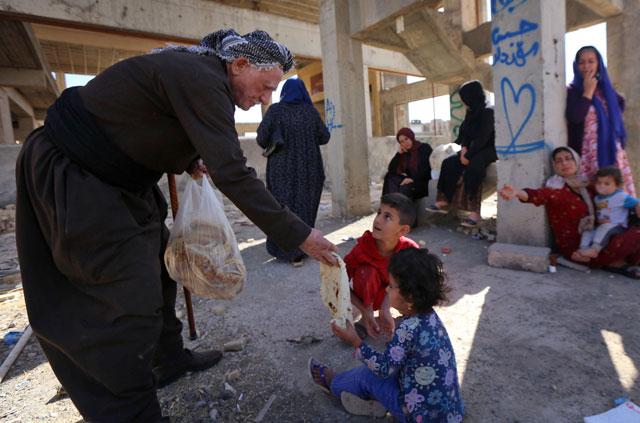You are here
Uneasy alliances as fractured Iraq battles Daesh
By AP - Feb 19,2015 - Last updated at Feb 19,2015

KIRKUK, Iraq — Shiite Arab militias have flooded into northern Iraq's Kirkuk region to help Kurdish forces battle Daesh terror group, but their uneasy alliance threatens to reignite a much older conflict over the oil-rich area pitting the largely autonomous Kurds against the Arab-led government in Baghdad.
All across Iraq, the rapid advance by the Daesh extremists over the past year has drawn longtime rivals into reluctant alliances. The shared struggle could with time help Iraqis forge a long-elusive sense of national unity. But it also risks papering over disputes that could burst into the open if the threat subsides.
Here are some of the strange bedfellows in Iraq's fight against Daesh.
Kurds and Shiites
Shiite Arab militias officially known as the Popular Mobilisation Forces have teamed up with the Kurdish peshmerga in a number of battles, breaking the siege of the northern Shiite-majority town of Amirli in August and more recently, driving Daesh militants from a string of towns in Diyala province, northeast of Baghdad.
But Kirkuk is different. Kurdish forces claimed control of the city just days after Daesh swept across northern Iraq last June, and their longstanding goal of incorporating it and surrounding areas into their semi-autonomous region seemed within reach. But the city's Arabs and Turkmen, as well as Baghdad, have long opposed such a scenario.
For now, the Shiite fighters are making common cause with the Kurds against Daesh group, a mortal enemy of both. But if the Iranian-backed militias gain a foothold in the region, they could one day help Baghdad wrench it back.
Kurdish regional President Massoud Barzani alluded to such fears earlier this week, saying only peshmerga troops can operate in the city of Kirkuk. The next day Hadi Al Amiri, a top Shiite militia commander, told a Kurdish TV channel his forces "are able to go wherever if needed."
The US and Iran
As the United States has assembled a coalition to aid Iraqi forces with air strikes, Baghdad's influential neighbour Iran has organised and backed the Shiite militias on the ground. Both sides are also believed to be aiding Kurdish forces. Iraq has welcomed aid from both, but risks being drawn into a region-wide proxy war pitting Iran against the US and its Gulf allies.
While Washington and Tehran both view Daesh as a regional menace, they are sharply divided on the conflict in Syria, where Iran is a key backer of President Bashar Assad. They have also long been at odds over Iran's disputed nuclear programme, as well as its hostility towards Israel and support for groups like Hizbollah and Hamas.
The United States and Iran insist they do not coordinate their operations in Iraq, making it in many ways an alliance of inconvenience.
The government
and the Sunnis
Virtually everyone agrees that the only way to defeat Daesh is to rally tribes and militias in the Sunni heartland to rebel against it. The formula worked for a time starting in 2006, when Sunnis allied with US troops to drive out Al Qaeda in Iraq, a precursor of the extremist group.
This time it will be more difficult. Many of the Sunni tribes that took part in the Sahwa, or Awakening, feel they were later betrayed by the Shiite-led government, which neglected them after the Americans left. They also harbour a deep distrust of the Shiite militias, which rights groups say have terrorised Sunni civilians. Daesh has meanwhile severely punished those who have opposed it, massacring scores of men, women and children from unruly tribes in a brutal warning to others.
Iraq's Prime Minister Haider Al Abadi has tried to reach out to Sunnis following the divisive rule of his predecessor Nouri Al Maliki, pushing for the creation of a new National Guard force reminiscent of the Sahwa. But many Shiites in his government distrust the Sunni tribes, viewing them as a holdover from the cruel reign of Saddam Hussein's Sunni-dominated government. And it's not yet clear whether enough Sunnis in Daesh’s self-styled caliphate see the Baghdad government as a better option.
Iraqi Kurds
and non-Iraqi Kurds
The Kurds have proven to be the most unified and disciplined force battling Daesh group, but even among them there are divisions that could undermine their struggle.
Kurdish militiamen from the Turkey-based Kurdish Workers' Party (PKK) and the Syria-based People's Protection Units (YPG) have crossed into Iraq and massed outside the northern town of Sinjar, a town still in the grip of Daesh militants despite months of blistering air strikes.
The Kurdish peshmerga have been a close US ally since Saddam's rule, but the PKK waged a long and bloody struggle against NATO ally Turkey, and Washington considers it a terrorist group. The YPG has, meanwhile, claimed Sinjar and surrounding areas as part of Rojava, its self-declared Kurdish enclave in northern Syria, against the wishes of Iraq's Kurds.
Related Articles
ERBIL, Iraq — Iraq's autonomous Kurdish region on Wednesday announced it would hold a referendum on independence, in a move the central gove
ERBIL, Iraq/BAGHDAD — About 100,000 Kurds have fled the Kirkuk region for fear of persecution since Iraqi armed forces retook disputed terri
ERBIL, Iraq — Kurdish forces backed by US-led coalition air strikes drove Daesh militants out of 10 villages in Iraq's Kirkuk province on We













